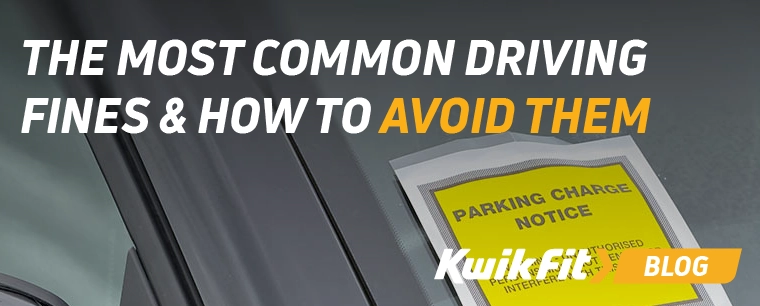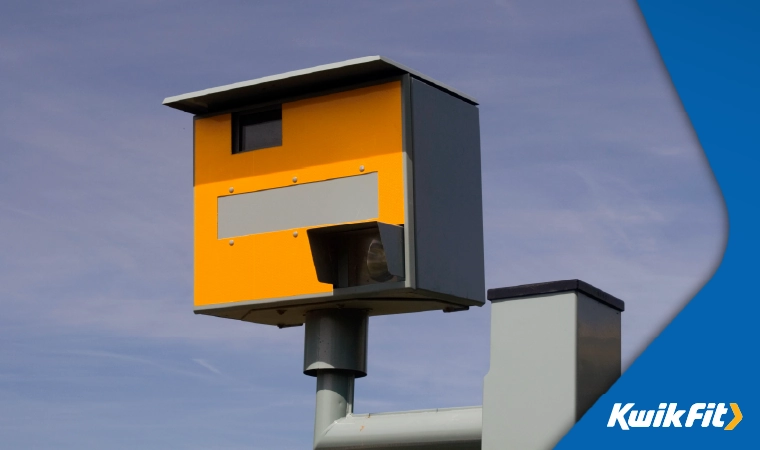The Most Common Driving Fines & How To Avoid Them
Kwik Fit | Tuesday 16th September 2025 10:05am

Driving offers freedom, convenience, and for many of us, it's part of our daily routine. But even experienced motorists can find themselves on the wrong side of the law, often without meaning to!
In the UK, thousands of drivers are fined every year for avoidable mistakes, many of which are caused by simple lapses in attention, changes in the law, or unfamiliar surroundings. Whatís more, with many offences now caught on camera or via ANPR (automatic number plate recognition), thereís even less room for error.
Letís look at the most common driving fines in the UK, what they could cost you, and (most importantly) how you can avoid them.
1. Speeding is the UKís most frequent driving offence
Speeding is the most common driving offence across the UK, and it's easy to see why. Drivers are often in a rush or (sometimes) simply not paying attention to the speedometer. So, slipping a few miles an hour over the limit can easily happen. But with speed cameras in more places than ever and local authorities cracking down on driving offences, itís not worth the risk to get to your destination a minute or so sooner.
- Fines for speeding start at £100, along with three points on your licence.
- For more serious cases Ė like driving at excessive speed or repeat offences Ė fines can rise to £1,000, or £2,500 if youíre caught speeding on a motorway.
- Drivers can also face disqualification depending on the circumstances.
To avoid a speeding fine, get into the habit of checking road signs frequently, especially when driving through unfamiliar areas Ė and donít just blindly accept what your satnav tells you the speed limit is!
Speed limits can change suddenly, particularly in residential zones and near schools. If your car is fitted with cruise control, it can also be a useful tool to maintain a steady pace on long journeys.

2. Bus lane violations
Bus lane fines are another common headache for drivers, particularly in city centres. Many bus lanes are monitored by cameras, and even a brief moment in one outside of permitted hours can trigger a penalty notice.
- Fines vary depending on location. Outside London, youíll usually face a £60 charge, which can be halved if you pay within a certain time-frame.
- In London, however, fines can reach up to £160, again with reductions for early payment.
- These offences don't add points to your licence, but repeated violations could catch the attention of local enforcement.
To avoid getting caught out, keep an eye on the signs posted near bus lanes. Some are operational 24/7, while others are restricted only during peak hours. If youíre unfamiliar with the area, a sat nav or navigation app that flags restricted lanes can help steer you clear. If you're planning to drive in busy cities, you might also want to read our city driving tips blog.

3. Mobile phone use behind the wheel
Using a mobile phone while driving is one of the most dangerous and heavily penalised offences in the UK Ė and for good reason. Itís illegal to hold or use your phone for any purpose while driving, including when youíre stopped at traffic lights or queuing in traffic.
- The fine for being caught is £200, and youíll receive six points on your licence.
- For new drivers, thatís enough to lose your licence entirely. Itís simply not worth the risk Ė not just for the chance that youíll lose your licence, but for the very real chance that driving while distracted can quickly land you in potentially fatal situations.
The best way to avoid this is to set everything up before you begin your journey. If you need navigation or hands-free calling, make sure your phone is docked and ready before you hit the road. Many newer vehicles have voice-activated systems that allow you to stay connected without taking your hands off the wheel. And, if you absolutely need to use your phone, find a safe place to pull over and switch the engine off.
4. Not wearing a seatbelt
It might seem like a basic rule, but failing to wear a seatbelt is still, somehow, one of the most common motoring offences in the UK. Whether itís a short trip to the shops or a ride in the back seat of a taxi, the law requires everyone in the vehicle to buckle up.
And this isnít just for the sake of the law; in 2023, 21% of car occupants who were killed in collisions werenít wearing seatbelts, which indicates a disproportionate risk of fatality when not wearing one.
- If you're caught not wearing a seatbelt, you could receive a fixed penalty of £100.
- In more serious cases, or if the matter goes to court, fines can reach up to £500.
- While you wonít get points on your licence, itís still an offence that can show up on your driving record.
To avoid fines (and more importantly, protect your safety), make fastening your seatbelt a non-negotiable part of your driving routine. Double-check that passengers are wearing theirs too, especially children or those in the back seats, as children sometimes pick up a habit of unbuckling themselves.
If your seatbelt warning light isnít functioning or youíve noticed an issue with the mechanism, it's worth addressing this as soon as possible at your local Kwik Fit centre.

5. Parking fines and penalty charge notices (PCNs)
Parking tickets might not involve dangerous driving, but theyíre still a major contributor to motoring fines in the UK. Whether it's overstaying in a time-limited bay or parking in a residents-only zone, even short mistakes can be costly.
- Penalty Charge Notices usually range from £60 to £100, but many authorities offer a 50% discount if you pay within 14 days.
- While they donít come with licence points, unpaid PCNs can escalate to court action or enforcement by bailiffs.
The best way to avoid a parking fine is to always check signs and markings before leaving your vehicle. Time limits, permit zones, and loading restrictions can all catch drivers off guard. Parking apps are a handy tool too Ė they can send you reminders or allow you to extend your stay remotely, but theyíre only usually available for private car parks, which may have different-value fines for parking violations.
6. Driving without a valid MOT or insurance
While this most often happens by accident, two of the most serious administrative offences are driving without a valid MOT or valid insurance policy. Both are not only illegal but carry potentially severe consequences.
- If your MOT has expired, you can be fined up to £1,000.
- Driving without insurance is even more serious, with an unlimited fine, six to eight penalty points, and the potential for your vehicle to be seized.
- In some cases, you could even face disqualification.
Avoiding these penalties comes down to organisation. You can check your MOT status online in seconds, and setting a calendar reminder is a simple way to stay on top of your renewal date (or by using our free reminder service).
Booking your MOT through our online system, however, makes it quick and easy. As for insurance, make sure your policy is renewed and up to date Ė and be sure not to drive before your new cover starts.
7. Careless or dangerous driving
This category includes a range of behaviours, from tailgating and lane hogging to running red lights and overtaking dangerously. Itís one of the more serious types of driving offences and can result in stiff penalties.
- Careless driving can lead to fines of up to £5,000 and between three and nine points on your licence.
- Dangerous driving, meanwhile, carries unlimited fines, driving bans, and even custodial sentences.
Prevention here is all about mindset. Stay calm behind the wheel, allow plenty of time for your journey, and avoid distractions. It might sound obvious, but a little patience and awareness go a long way when it comes to staying safe (and legal). You can read more in our guide to safer driving habits.
Stay safe on the road with Kwik Fit
Avoiding fines isnít just about following rules; itís about keeping yourself, your passengers, and everyone else on the road safe. Most of these common offences are entirely preventable with a little preparation, awareness, and regular vehicle maintenance.
Make it a habit to keep your car in top shape with routine services and MOTs, stay informed about current driving laws, and take care of admin like insurance and tax well before deadlines approach. These small habits can make a big difference Ė not just in avoiding fines, but in becoming a more confident and responsible driver overall.
If you need any help with your car maintenance, or a particular component is giving you problems, the experts at your local Kwik Fit centre are always on hand to help.
Any facts, figures and prices shown in our blog articles are correct at time of publication.
Featured Articles
Is it Illegal to Drive With One Headlight?
Saturday 19th July 2025
Wondering if itís illegal to drive with one headlight? Learn about the safety risks and penalties of illegal blown bulbs and why you should fix them promptly.
Air Con in EVs & Hybrids: Experts Answer Your Questions
Monday 30th June 2025
Does air con drain EV batteries? Can you use the air con while charging an electric car? Find out the answers to these questions & more from Kwik Fitís experts.
Why Is Your Car Making a Noise? Fixes & Tips
Friday 13th June 2025
When your car starts making unexpected noises, it can certainly be quite disconcerting; it may be nothing to worry about, but hereís what you need to know.









